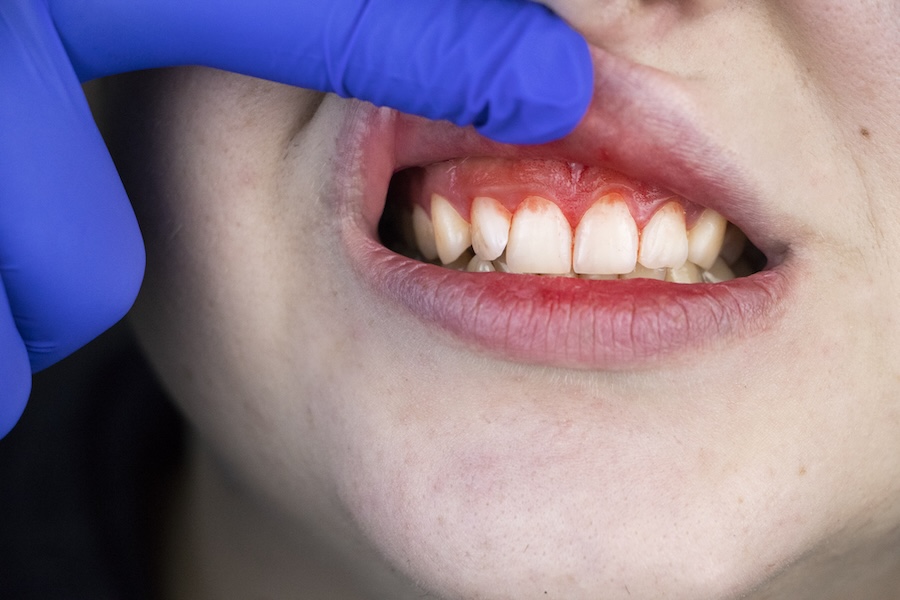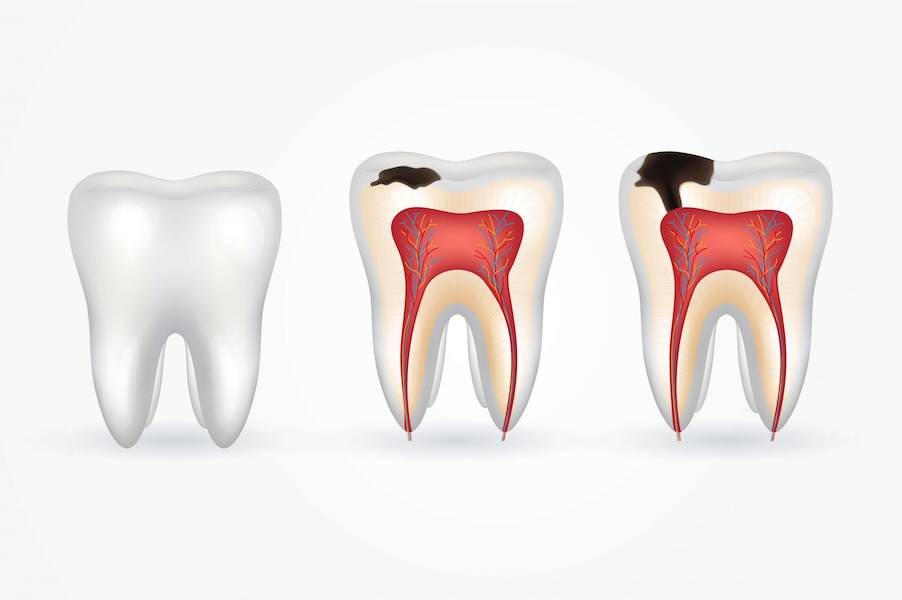Periodontitis is a serious and irreversible infection that affects the gums and bones surrounding the teeth. If left untreated, periodontitis will rapidly progress to cause bone loss, and eventually, tooth loss.
In a nutshell, bone loss in teeth occurs when the structures that hold the teeth in place, such as the gums and the jawbone, are compromised. This can be due to several factors, but the most common cause is poor oral hygiene, which causes plaque and bacteria build-up. Bacteria will first harm the gums to cause gum disease. At this stage, the disease can still be reversed. However, if bacteria is not removed, it will eventually penetrate the bone, causing periodontitis.
Periodontitis not only affects the function of your teeth and the appearance of your smile, but it may also lead to serious health issues, including potential impacts on heart health, if not addressed as soon as possible.
In this read, we will learn more about periodontitis and bone loss, how it occurs, available treatment options, and how to prevent it.

Causes of Periodontitis
Periodontitis is typically caused by bacterial plaque that has infected the gums and the bone. But, other factors may also increase your risk of developing the condition.
Poor Oral Hygiene and Plaque Build-up
Poor oral hygiene, leading to plaque and bacteria build-up, is the most common culprit of periodontal disease.
Plaque is a sticky film of bacteria that forms on the teeth. Sugars from the food and drink you consume interact with the bacteria in the mouth to form plaque. Ideally, this should be removed with proper teeth cleaning and flossing. But, if this is left too long, the bacteria from plaque will lead to gum inflammation and, eventually, periodontitis.
Genetic Factors
Some people can also be genetically more at risk of periodontitis. If you know anyone in the family who is dealing with gum or periodontal problems despite proper efforts to avoid it, it may be that your genetic makeup is the concern. If this is so, it is important to be extra vigilant with your hygiene and routinely consult with your dentist to prevent serious problems.
Lifestyle Choices
Smoking is also a significant risk factor for gum disease. Toxins from tobacco harm the immune system, making it harder for the body to fight off infection due to periodontitis. Additionally, smoking reduces blood flow to the gums, which may cause bone loss. Other lifestyle factors, such as nutritional deficiency and increased stress levels, may also weaken the immune defences and contribute to periodontal disease.
Medical Conditions
Diabetes is closely linked to gum and periodontal disease because of how it affects the body’s ability to heal. Because of this, gum disease may rapidly progress to periodontitis. If you have diabetes, learn more about how it impacts oral health.
Medications
Certain medications known to cause dry mouth increase the risk for periodontal problems because of poor saliva flow. Saliva is a natural defence of the body because it washes away bacteria in the mouth. Without enough of it, bacteria may accumulate in the mouth more easily.

Diagnosis of Periodontitis and Bone Loss
Visual inspection, imaging techniques, and laboratory tests are some of the steps that your dentist may take to diagnose periodontal disease properly.
- Clinical Examination – Some visible signs of periodontitis are gum inflammation, plaque build-up and receded gums. A periodontal probe is used to check if there is bone loss. This is inserted into the gum area to measure bone depth. Deep pockets indicate bone loss and may be a sign of periodontitis.
- X-rays – A full mouth x-ray shows the extent of bone loss. This will confirm the diagnosis of the disease.
- Laboratory Tests – A microbial analysis of the bacteria in the mouth may also be done to create a more conclusive diagnosis. Some bacterial species show a higher count for periodontitis.
Treatment and Management of Periodontitis
There are several ways in which your dentist can treat periodontal problems, and the severity of the condition usually depends on them.
Non-surgical Treatments
The first treatment option for periodontitis is scaling and root planing. This procedure involves removing infected tissues above and below the gum line. The goal is to eliminate bacteria and prevent it from coming back. The root surfaces are also smoothened out to allow the gums to heal and reattach to the teeth.
Surgical Treatments
The surgical approach to periodontal treatment is targeted to repair lost tissue, restore the appearance to the smile, and improve the long-term health of the teeth. This includes:
- Flap surgery is a procedure that involves repairing receded gums and eliminating deep pockets. This can be done either by lifting the gums and reattaching them to a better position.
- Bone grafts can be placed on areas with severe bone loss. This may use artificial bone substitutes or bone from other body parts to repair and regenerate bone tissue.
- Soft tissue grafts are recommended to restore the appearance of receded gums. Gum grafts are attached to cover exposed roots and prevent further recession.
- Guided tissue regeneration is done in conjunction with bone grafts, where biomaterials are used to stimulate the growth of new bone.
Maintenance and Prevention
After treatment and management of the disease are carried out, maintaining good oral health will prevent the disease from coming back. Visit your dentist every six months or as recommended, adopt efficient oral hygiene practices, and make better lifestyle choices to keep your smile healthy and beautiful.
Preventing Bone Loss in Teeth
Preventing periodontitis is much easier than treating it. The goal is mainly to maintain healthy gums and teeth to avoid bacteria that may cause disease.
Here are some tips:
- Maintain good oral hygiene. Brush the teeth twice a day using fluoride-rich toothpaste and floss daily.
- Visit your dentist bi-annually for routine check-ups and teeth cleaning.
- Eat a balanced diet rich in vitamins and minerals to boost the immune system and support oral health.
- Quit smoking to significantly reduce the risk of periodontitis.
- Manage medical conditions that may have an effect on the periodontal health.
Contact Sierra Dental Today
Periodontitis is a highly preventable disease if caught early. Otherwise, you may have to deal with its irreversible consequences, including bone and tooth loss.
By adopting good hygiene practices, making healthy lifestyle choices, being more aware of the risk factors and causes of the disease, and learning the other preventive ways, you can reduce your chances of getting periodontal disease to maintain a healthy and beautiful smile.
If you are concerned about your gum health and want to learn more about periodontitis, contact Sierra Dental in Signal Hill today by calling 403-297-9600!